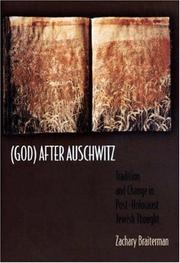| Listing 1 - 1 of 1 |
Sort by
|

ISBN: 0691059411 9786612935213 1282935216 1400822769 1400811120 9781400811120 9780691059419 9781400822768 9781282935211 6612935219 1400815274 Year: 1998 Publisher: Princeton, N.J. Princeton University Press
Abstract | Keywords | Export | Availability | Bookmark
 Loading...
Loading...Choose an application
- Reference Manager
- EndNote
- RefWorks (Direct export to RefWorks)
The impact of technology-enhanced mass death in the twentieth century, argues Zachary Braiterman, has profoundly affected the future shape of religious thought. In his provocative book, the author shows how key Jewish theologians faced the memory of Auschwitz by rejecting traditional theodicy, abandoning any attempt to justify and vindicate the relationship between God and catastrophic suffering. The author terms this rejection "Antitheodicy," the refusal to accept that relationship. It finds voice in the writings of three particular theologians: Richard Rubenstein, Eliezer Berkovits, and Emil Fackenheim. This book is the first to bring postmodern philosophical and literary approaches into conversation with post-Holocaust Jewish thought. Drawing on the work of Mieke Bal, Harold Bloom, Jacques Derrida, Umberto Eco, Michel Foucault, and others, Braiterman assesses how Jewish intellectuals reinterpret Bible and Midrash to re-create religious thought for the age after Auschwitz. In this process, he provides a model for reconstructing Jewish life and philosophy in the wake of the Holocaust. His work contributes to the postmodern turn in contemporary Jewish studies and today's creative theology.
Holocaust (Jewish theology). --- Judaism --- Theodicy. --- Holocaust (Jewish theology) --- -Theodicy --- Evil, Problem of (Theology) --- God --- Permissive will of God --- Problem of evil (Theology) --- Good and evil --- Theodicy --- Jews --- Religions --- Semites --- Permissive will --- Will, Permissive --- Religious aspects --- Religion --- Holocauste, 1939-1945 --- Théodicée --- Judaïsme --- Aspect religieux --- Histoire --- Judaism - 20th century. --- Judaism -- 20th century. --- Abraham Joshua Heschel. --- Absolute (philosophy). --- Aggadah. --- Agnon. --- Anguish. --- Antinomianism. --- Apocalyptic and post-apocalyptic fiction. --- Arnold Eisen. --- Atheism. --- Avi Weiss. --- Bible. --- Book of Deuteronomy. --- Book of Job. --- Book of Leviticus. --- Bruno Bettelheim. --- Buber. --- Censure. --- Christianity and antisemitism. --- Deity. --- Deuteronomist. --- Divine judgment. --- Elie Wiesel. --- Eliezer Berkovits. --- Elisha. --- Emil Fackenheim. --- Emil Nolde. --- Ephraim Urbach. --- Exegesis. --- Extermination camp. --- Finkelstein. --- Franz Rosenzweig. --- Gershom Scholem. --- God is dead. --- God. --- Good and evil. --- Hans-Georg Gadamer. --- Haredi Judaism. --- Hebrew Bible. --- Hermann Cohen. --- Hermeneutics. --- Hyperbole. --- Image of God. --- Isaac Luria. --- Israelites. --- Jewish history. --- Jewish philosophy. --- Jews. --- Job (biblical figure). --- Judaism. --- Judith Plaskow. --- Justification (theology). --- Kabbalah. --- Korah. --- Land of Israel. --- Leon Uris. --- Literature. --- Martin Buber. --- Martin Heidegger. --- Midrash. --- Mila 18. --- Mitzvah. --- Modernity. --- Mysticism. --- Narrative. --- Nazism. --- Omnibenevolence. --- Omnipotence. --- Philosopher. --- Philosophy. --- Postmodern philosophy. --- Postmodernism. --- Primo Levi. --- Princeton University Press. --- Problem of evil. --- Rabbi. --- Rabbinic Judaism. --- Rabbinic literature. --- Radical evil. --- Rebuke. --- Reform Judaism. --- Religion. --- Religious text. --- Rhetoric. --- Rhetorical device. --- Righteousness. --- Rosenzweig. --- Scholem. --- Soloveitchik. --- Sources of the Self. --- Steven Zipperstein. --- Supervisor. --- The Exodus. --- The History of Sexuality. --- Theism. --- Theology. --- Thought. --- Torah. --- Wissenschaft des Judentums. --- Writing.
| Listing 1 - 1 of 1 |
Sort by
|

 Search
Search Feedback
Feedback About UniCat
About UniCat  Help
Help News
News